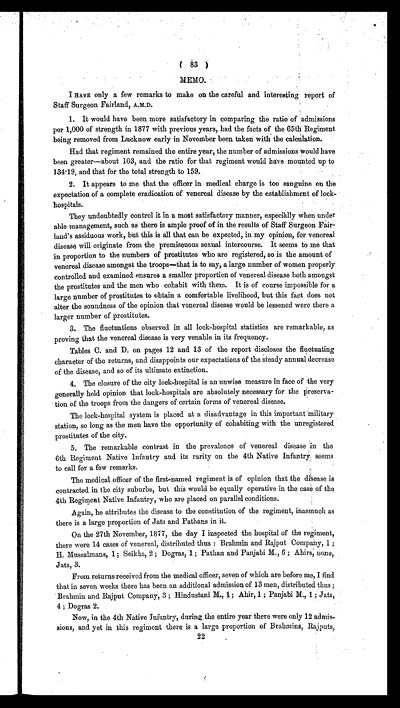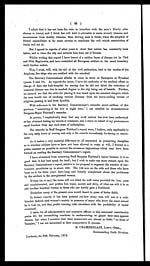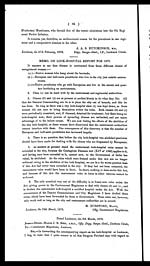Medicine - Institutions > Lock hospitals > Annual report on the working of the lock hospitals in the North-Western Provinces and Oudh > Fourth annual report on the working of the lock-hospitals in the North-Western Provinces and Oudh for the year 1877
(91) Page 83
Download files
Individual page:
Thumbnail gallery: Grid view | List view

( 83 )
MEMO.
I HAVE only a few remarks to make on the careful and interesting report of
Staff Surgeon Fairland, A.M.D.
1. It would have been more satisfactory in comparing the ratio of admissions
per 1,000 of strength in 1877 with previous years, had the facts of the 65th Regiment
being removed from Lucknow early in November been taken with the calculation.
Had that regiment remained the entire year, the number of admissions would have
been greater—about 103, and the ratio for that regiment would have mounted up to
134.19, and that for the total strength to 159.
2. It appears to me that the officer in medical charge is too sanguine on the
expectation of a complete eradication of venereal disease by the establishment of lock-
hospitals.
They undoubtedly control it in a most satisfactory manner, especially when under
able management, such as there is ample proof of in the results of Staff Surgeon Fair-
land's assiduous work, but this is all that can be expected, in my opinion, for venereal
disease will originate from the promiscuous sexual intercourse. It seems to me that
in proportion to the numbers of prostitutes who are registered, so is the amount of
venereal disease amongst the troops—that is to say, a large number of women properly
controlled and examined ensures a smaller proportion of venereal disease both amongst
the prostitutes and the men who cohabit with them. It is of course impossible for a
large number of prostitutes to obtain a comfortable livelihood, but this fact does not
alter the soundness of the opinion that venereal disease would be lessened were there a
larger number of prostitutes.
3. The fluctuations observed in all lock-hospital statistics are remarkable, as
proving that the venereal disease is very venable in its frequency.
Tables C. and D. on pages 12 and 13 of the report discloses the fluctuating
character of the returns, and disappoints our expectations of the steady annual decrease
of the disease, and so of its ultimate extinction.
4. The closure of the city lock-hospital is an unwise measure in face of the very
generally held opinion that lock-hospitals are absolutely necessary for the preserva-
tion of the troops from the dangers of certain forms of venereal disease.
The lock-hospital system is placed at a disadvantage in this important military
station, so long as the men have the opportunity of cohabiting with the unregistered
prostitutes of the city.
5. The remarkable contrast in the prevalence of venereal disease in the
6th Regiment Native infantry and its rarity on the 4th Native Infantry seems
to call for a few remarks.
The medical officer of the first-named regiment is of opinion that the disease is
contracted in the city suburbs, but this would be equally operative in the case of the
4th Regiment Native Infantry, who are placed on parallel conditions.
Again, he attributes the disease to the constitution of the regiment, inasmuch as
there is a large proportion of Jats and Pathans in it.
On the 27th November, 1877, the day I inspected the hospital of the regiment,
there were 14 cases of venereal, distributed thus : Brahmin and Rajput Company, 1 ;
H. Mussalmans, 1; Seikhs, 2 ; Dogras, 1; Pathan and Panjabi M., 6 ; Ahirs, none,
Jats, 3.
From returns received from the medical officer, seven of which are before me, I find
that in seven weeks there has been an additional admission of 13 men, distributed thus ;
Brahmin and Rajput Company, 3 ; Hindustani M., 1; Ahir, 1 ; Panjabi M., 1 ; Jats,
4 ; Dogras 2.
Now, in the 4th Native Infantry, during the entire year there were only 12 admis-
sions, and yet in this regiment there is a large proportion of Brahmins, Rajputs,
22
Set display mode to: Large image | Zoom image | Transcription
Images and transcriptions on this page, including medium image downloads, may be used under the Creative Commons Attribution 4.0 International Licence unless otherwise stated. ![]()
| Permanent URL | https://digital.nls.uk/75111104 |
|---|




